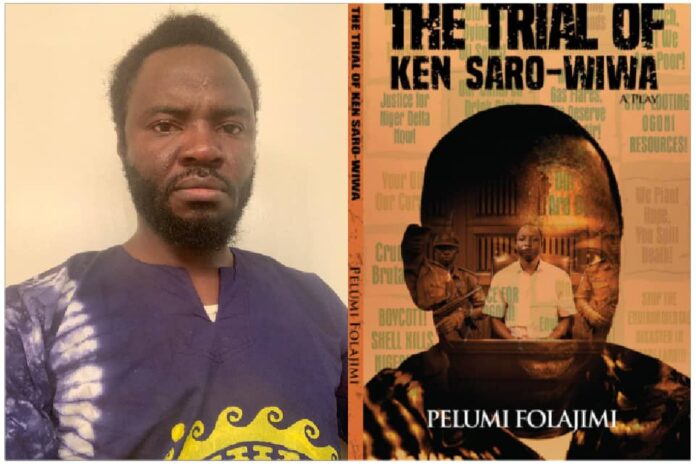In Nigeria’s vibrant theatre scene, playwrights often double as historians, critics, and cultural custodians. But with the recent buzz surrounding his new play The Trial of Ken Saro-Wiwa, Pelumi Folajimi has ignited a new conversation, one that blurs the line between artistic intuition and foresight.
In June 2025, just days before President Bola Ahmed Tinubu posthumously honoured Ken Saro-Wiwa with a national award, Folajimi was already engaging his followers in passionate discussions about the late environmental activist. Through posts on his Facebook page, he revisited Saro-Wiwa’s life, activism, and legacy, culminating in the announcement of his latest play, The Trial of Ken Saro-Wiwa, which is due to be released by the Pan-African Press.
To many, the timing was more than coincidental.
“It’s as though he saw something coming,” said one theatre enthusiast who has followed Folajimi’s work closely. “Before the media, before the presidency, Folajimi was already preparing our minds for Saro-Wiwa’s return to the national stage.”
This isn’t the first time Pelumi Folajimi has engaged the mystical or prophetic in his works. In his earlier play King Adekunle, the character Baba Fagbemi, an aged priest, evokes strong similarities to the Greek seer Tiresias from Oedipus Rex: wise, cryptic, and eerily accurate. It was a dramatic choice, perhaps, but one that now invites deeper reflection. Could the artist himself be channeling something more?
The Trial of Ken Saro-Wiwa is not a historical documentary, but it is steeped in real-life events. The play dramatizes the struggles of the Ogoni people and their decades-long resistance against environmental degradation caused by oil exploration in the Niger Delta. Central to the story is Ken Saro-Wiwa, who led the non-violent campaign against the Nigerian government and Shell in the early 1990s before his execution in 1995 by the military regime.
In Folajimi’s hands, that story is not just retold, it’s reimagined. The playwright fuses political critique with lyrical intensity, using theatre not just to recall the past, but to ignite fresh dialogue. His portrayal of the Ogoni struggle is unflinching, highlighting the deep scars left by environmental injustice, corporate greed, and state violence.
Critics are already describing the play as a vital contribution to Nigeria’s cultural and political discourse, particularly in a year when Saro-Wiwa’s name has once again become a fixture in national conversations.
Folajimi’s work taps into our collective memory and forces us to ask difficult questions. But beyond that, there’s something uncanny about the timing. He didn’t just respond to events, he anticipated them.
Whether or not Pelumi Folajimi possesses any prophetic gift remains up for debate. What’s clear is that he is more than a storyteller. He is a dramatist who listens closely to the present, the past, and perhaps, to deeper rhythms many of us miss.
And in a country where artists often serve as moral compasses, Folajimi’s latest offering reminds us that theatre is not just entertainment—it can be foresight, resistance, and revelation all at once.



